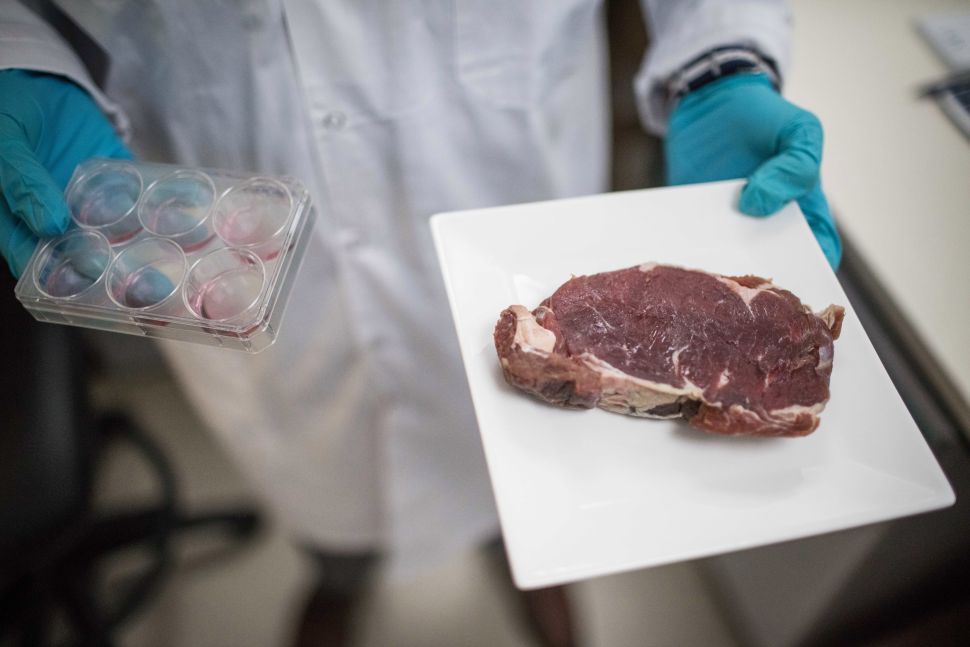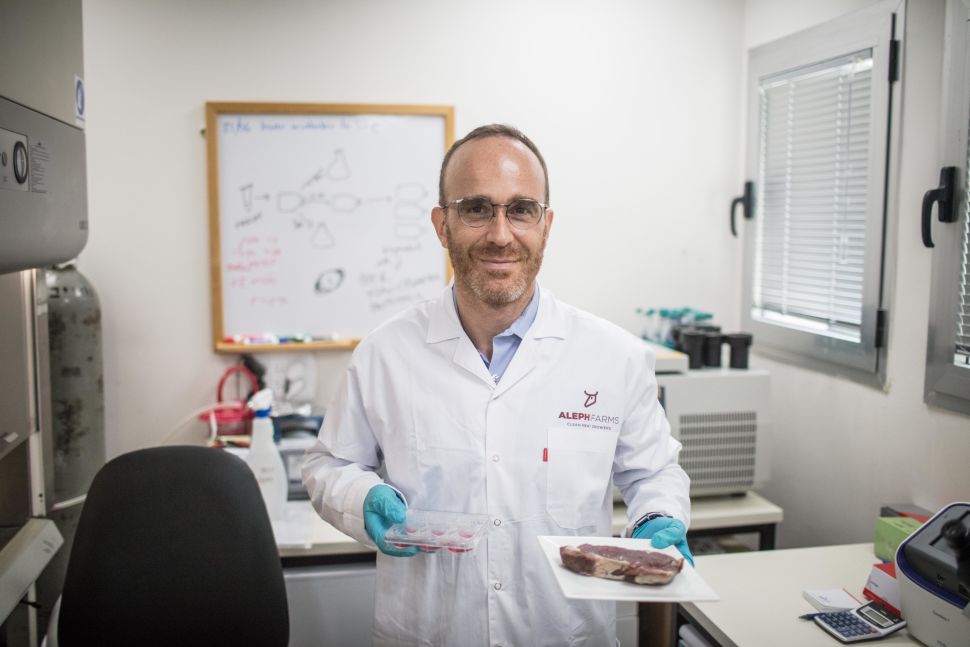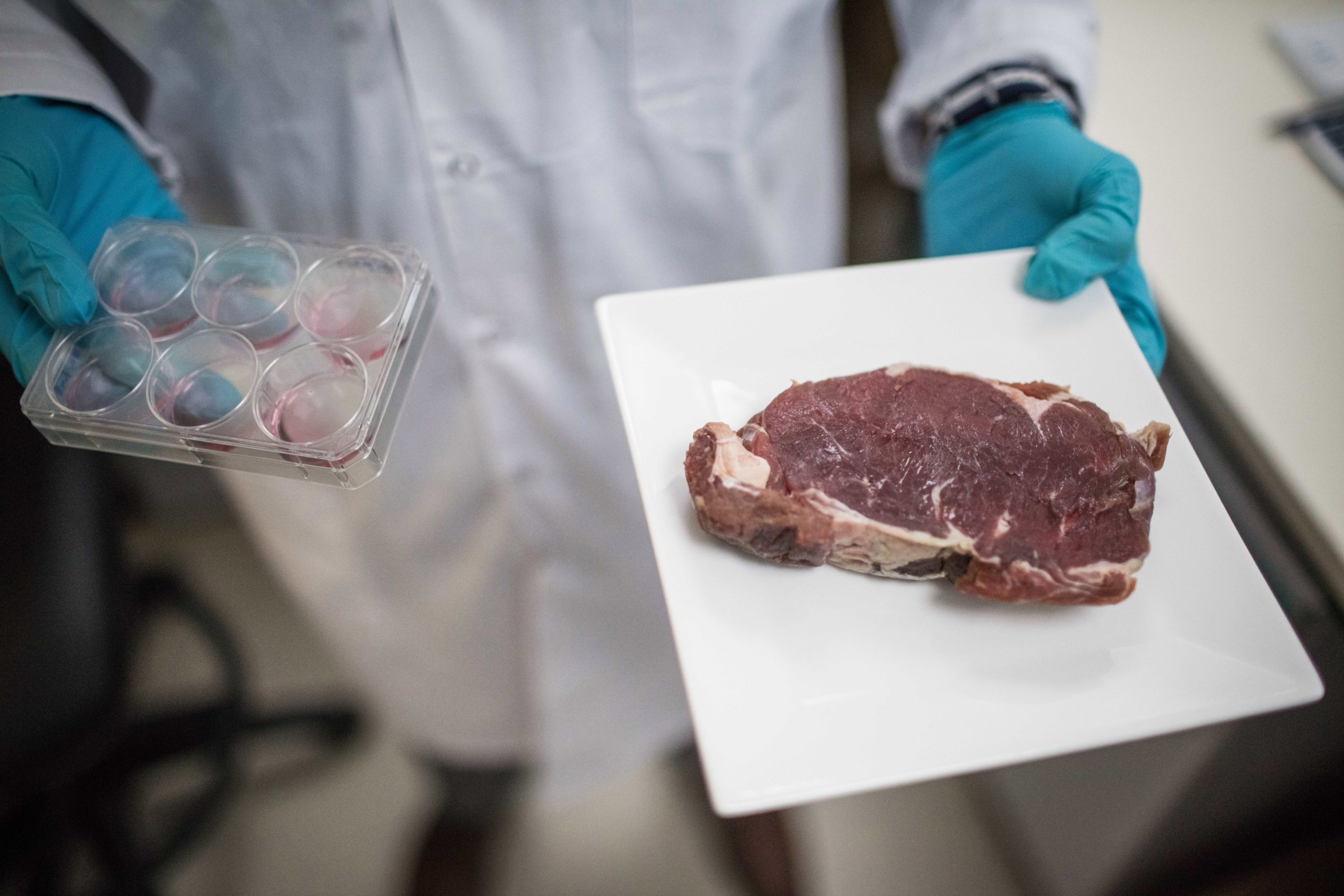
Startup founder Didier Toubia holds a petri dish and a plate with a steak in his hands. Ilia Yechimovich/photo alliance through Getty Images
The meat marketplace is experiencing unparalleled disruption, and not only from the pink warm industry for bogus meat. There is also the increasing pattern of also authentic meat developed in “biofarms,†or laboratories using highly developed stem cell tech to crank out edible animal areas without owning to raise the precise animal.
Israeli startup Aleph Farms is 1 of the trailblazers of this meaty innovation. Impressed by the underlying tech of regenerative medication, the organization employs a 3D tissue engineering platform to mature meat cuts from cow cells. The end product or service is biologically equivalent to what you’ll get from a butcher’s shop or grocery store. “Instead of raising an animal for two to 4 several years and eating only 40 p.c of it in the end, we can right cultivate a steak in 3 to 4 months with a portion of means,†reported Aleph Farms cofounder and CEO Didier Toubia.
Previously this thirty day period, Observer spoke with Toubia about the numerous added benefits of cultivated meat, how it is basically distinctive than vegan meat alternatives, and how considerably it is from showing on the menu of Michelin star dining establishments.
Can you briefly stroll me by means of the main technologies powering your meat-growing procedure? How did the strategy occur alongside?
The advancement of our “biofarm†depends on two decades of analysis in regenerative medication. Aleph Farms was co-founded by Israeli foodTech incubator The Kitchen, part of the Strauss Group Ltd., and The Technion–Israel Institute of Engineering. We worked with professor Shulamit Levenberg, who’s a top figure in this space. What she’s been doing work on in the past 20 decades is rising items of human organs outside of a person’s system for medical needs.
We are striving to apply the exact same strategy and know-how she has gathered about this incredibly prolonged time of investigation to rising muscle tissues from a cow, or bovine cells. We just take stem cells from a cow and increase them in a managed natural environment that mimics the circumstances within the animal’s overall body, such as temperature, PH level, CO2 pressure and so on. The “biofarm†is kind of an extension of the animal.
I see this strategy a little bit as a new form of domestication, but only on the muscle mass tissue amount, the edible pieces of an animal.
So theoretically, this technique can be employed to produce any variety of meat.
In basic principle, yes. What is great about this solution is that we can control the process—for case in point, incorporating far more (or significantly less) extra fat or producing the muscle fiber thicker or thinner.
Really, I don’t see cultivated meat as a alternative for traditional meat, but rather as a new category of meat products. We think that, in 10 or 15 years, we’ll have different categories of meat, just like wines.
What motivated you to utilize this tech in foods production? Why is it groundbreaking for the business?
I think there are two causes. Initially, right now the food marketplace accounts for 26 % of global greenhouse gasoline emissions. And inside that 26 p.c, livestock is liable for 15 % (in accordance to the Foodstuff and Agriculture Group). So, if we want to achieve our local climate adjust plans of slowing down the rise of temperature and the reduction of arable land, we will need to adjust our food technique.
It’s a lot like the terrific horse manure crisis at the stop of the 19th century, when we experienced to innovate the transportation program to accommodate a rising city population. The agriculture method that was acceptable for 1.6 billion folks in 1900 is not more than enough to feed the 7.8 billion folks we have right now. So we have to invent new follow to develop foodstuff.
In our scenario, as an alternative of elevating an animal for two to 4 yrs and taking in only 40 per cent of it in the close, we can directly cultivate a steak in three to four months with a portion of sources.
The 2nd reason is community well being. About 700,000 individuals die each individual year from resistance to antibiotics. The substantial use of antibiotics in concentrated animal farming operations is one particular of the major motorists for that. The Environment Wellness Firm basically considers antimicrobial resistance a person of the two key threats to human species relocating ahead.
We can aid remedy this challenge, mainly because our meat is grown in a shut method without having any risk of external contamination. Pretty much all viruses identified in human beings originate from animals. Even flus appear from animals. And COVID-19. With the intensification of animal farming, we see a greater frequency of viruses transmitting from animals to human beings. And we have to prevent that.


Didier Toubia wishes to have the first Aleph Farms product on the marketplace in three several years. Ilia Yechimovich/photograph alliance by using Getty Photographs
That appears frightening. I recognize that Aleph Farms is nonetheless in the early stage of finding cultivated meat to the sector. When fully commercialized, how do you imagine biofarming will disrupt traditional meat production?
In the extensive expression, I believe cultivated meat will switch industrial farming, which represents 70 % of world meat creation today. We are not below to swap small-scale, loved ones-owned farming methods, even though.
How about cost and pricing? Will cultivated meat inevitably be more affordable than purely natural meat?Â
Certainly, in the long time period when we have reached financial system of scale, for the reason that we use less methods. In the small time period, cultivated meat will be additional highly-priced than conventional meat, not by a enormous magnitude, though—it will not be 10 situations much more expensive it will be two times the rate, possibly.
I feel we’ll be in a position to reach value parity in 5 years—which is quicker than lots of new plant-primarily based goods, this sort of as Not possible Food items, for instance.
On that note, do you see plant-dependent meat as a competitor?
I believe there is home in the marketplace for both of those ways. They are concentrating on distinct segments of the populace. We have a absolutely different philosophy than Unachievable Foodstuff or Further than Meat. We are not an choice meat corporation. We make authentic meat made from an option creation procedure.
Final year, you stated Aleph Farms was in talks with numerous restaurant chains about introducing your product to the menu? What’s the most current on all those promotions? Have you observed any cafe associates?
We’ve been in talks with chefs in different pieces of the environment, such as Michelin star cooks in Europe, the U.S. and Asia. So we are surely working with them.
At the close of the working day, for a new meat-escalating strategy to be thriving, it is not enough to just generate proteins a lot more efficiently. Meat is a incredibly emotional item in virtually any culture. So in buy for us to be thriving, we have to have to reproduce what meat really is by connecting to neighborhood foodstuff society in diverse markets. Which is why it is really significant for us to function with chefs who know how to join with buyers. They can aid us refine the practical experience of our solution.

